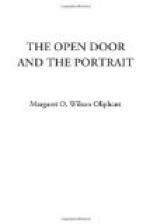He was still sitting there at his writing-table; he looked up astonished to see me hurrying in with my light. “Phil!” he said, surprised. I remember that I shut the door behind me, and came up to him, and set down the lamp on his table. My sudden appearance alarmed him. “What is the matter?” he cried. “Philip, what have you been doing with yourself?”
I sat down on the nearest chair and gasped, gazing at him. The wild commotion ceased; the blood subsided into its natural channels; my heart resumed its place. I use such words as mortal weakness can to express the sensations I felt. I came to myself thus, gazing at him, confounded, at once by the extraordinary passion which I had gone through, and its sudden cessation. “The matter?” I cried; “I don’t know what is the matter.”
My father had pushed his spectacles up from his eyes. He appeared to me as faces appear in a fever, all glorified with light which is not in them,—his eyes glowing, his white hair shining like silver; but his looks were severe. “You are not a boy, that I should reprove you; but you ought to know better,” he said.
Then I explained to him, so far as I was able, what had happened. Had happened? Nothing had happened. He did not understand me; nor did I, now that it was over, understand myself; but he saw enough to make him aware that the disturbance in me was serious, and not caused by any folly of my own. He was very kind as soon as he had assured himself of this, and talked, taking pains to bring me back to unexciting subjects. He had a letter in his hand with a very deep border of black when I came in. I observed it, without taking any notice or associating it with anything I knew. He had many correspondents; and although we were excellent friends, we had never been on those confidential terms which warrant one man in asking another from whom a special letter has come. We were not so near to each other as this, though we were father and son. After a while I went back to my own room, and finished the evening in my usual way, without any return of the excitement which, now that it was over, looked to me like some extraordinary dream. What had it meant? Had it meant anything? I said to myself that it must be purely physical, something gone temporarily amiss, which had righted itself. It was physical; the excitement did not affect my mind. I was independent of it all the time, a spectator of my own agitation, a clear proof that, whatever it was, it had affected my bodily organization alone.
Next day I returned to the problem which I had not been able to solve. I found out my petitioner in the back street, and that she was happy in the recovery of her possessions, which to my eyes indeed did not seem very worthy either of lamentation or delight. Nor was her house the tidy house which injured virtue should have when restored to its humble rights. She was not injured virtue, it was clear. She made me a great many curtseys, and poured forth




